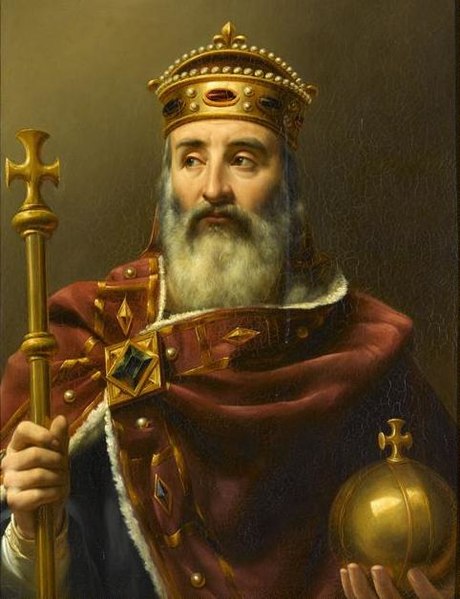This article explores a series of notable historical events that happened on January 28, each marking a significant moment in global and national histories across various centuries.
From the first recorded speeding conviction in 1896 to major technological advancements and legislative milestones, these events showcase the dynamic nature of human progress and its consequences.
Highlights include the establishment of the United States Coast Guard in 1915, the tragic Space Shuttle Challenger disaster in 1986, and the innovation of the Lego brick patent in 1958, among others.
Through these diverse occurrences, we gain insight into the complexities of technological, political, and social evolution, reflecting on how past developments continue to shape our present and future.
January 28th Events in History
814 – Charlemagne, King of the Franks and Lombards and Emperor of the Carolingians, dies
Charlemagne, also known as Charles the Great, was a medieval emperor who led the Frankish state in Western Europe. He was crowned Emperor of the Romans in 800 by Pope Leo III, uniting much of Western Europe for the first time since the Roman Empire.
Also Read: January 27 – On this Day in History
His death marked the end of his reign over an empire that spanned what is now France, Germany, Italy, Austria, and the Low Countries.

1547 – Henry VIII of England dies and is succeeded by his nine-year-old son Edward VI
Henry VIII was the King of England from 1509 until his death. He is well-known for his significant role in the separation of the Church of England from the Roman Catholic Church, his marriages to six wives, and his role in the dissolution of the monasteries.
Also Read: January 29th Events in History
His death led to the ascension of his nine-year-old son, Edward VI, who was the first English monarch to be raised as a Protestant.
1573 – Articles of the Warsaw Confederation are signed, sanctioning freedom of religion in Poland
The Articles of the Warsaw Confederation were a significant development in the religious history of Poland and Lithuania. They formally sanctioned religious freedom and tolerance within the Polish-Lithuanian Commonwealth, marking a notable early instance of official religious freedom in Europe.
1624 – Sir Thomas Warner founds the first British colony in the Caribbean, on Saint Kitts
Sir Thomas Warner established the first British colony in the Caribbean on Saint Kitts. This marked the beginning of the British colonial expansion in the Caribbean, which would eventually include several islands and play a crucial role in the development of the British Empire in the Americas.
1754 – Sir Horace Walpole coins the word serendipity in a letter to a friend
Sir Horace Walpole invented the word “serendipity” in a letter to a friend, inspired by the Persian fairy tale “The Three Princes of Serendip.” The term has since become widely used in the English language to describe the phenomenon of finding valuable or pleasant things that are not looked for.
1813 – Jane Austen’s “Pride and Prejudice” is published in the United Kingdom
Jane Austen’s “Pride and Prejudice” was published, becoming one of the most cherished novels in English literature. It explores themes of love, reputation, and class in the early 19th century English countryside through the relationship between Elizabeth Bennet and Fitzwilliam Darcy.
1820 – A Russian expedition led by Fabian Gottlieb von Bellingshausen and Mikhail Lazarev discovers the Antarctic continent
A Russian expedition led by Fabian Gottlieb von Bellingshausen and Mikhail Lazarev made the first sightings of the Antarctic continent. This was a pivotal moment in the exploration of the southernmost part of the Earth, laying the groundwork for future Antarctic exploration.

1821 – Alexander Ypsilantis starts the Greek War of Independence in Iași, launching a secret society against the Ottoman Empire
Alexander Ypsilantis, leading a group of Greek revolutionaries, initiated the Greek War of Independence against Ottoman rule. This war eventually led to the recognition of Greece as an independent nation, marking a significant moment in the struggle for national independence in the Balkans.
1871 – The French army relieves Paris in the Franco-Prussian War
During the Franco-Prussian War, the French army managed to relieve Paris after months of siege by Prussian forces. This event was significant in the late stages of the war, which ultimately led to the defeat of France and the unification of Germany under Prussian leadership.
1878 – Yale Daily News becomes the first daily college newspaper in the United States
The publication of the Yale Daily News marked the beginning of daily college journalism in the United States. It set a precedent for other colleges and universities to follow, contributing to the development of independent student journalism.
1896 – Walter Arnold of East Peckham, Kent becomes the first person convicted of speeding, fined for exceeding the speed limit of 2 mph in a populated area
Walter Arnold of East Peckham, Kent, made history by being the first person convicted of speeding. He was fined for driving at 8 mph in a zone where the speed limit was 2 mph, a stark contrast to today’s speed limits. This event underscored the evolving nature of road transport regulation as automobiles began to replace horse-drawn carriages.
1909 – The United States ends direct control over Cuba
he United States ended its direct military control over Cuba, which began in 1898 after the Spanish-American War.
This shift marked a significant moment in Cuban history, although the U.S. would continue to exert influence over the island, including the Platt Amendment’s imposition, which allowed the U.S. intervention in Cuban affairs.

1915 – The United States Coast Guard is created by merging the Revenue Cutter Service and the Life Saving Service
The U.S. Coast Guard was formed by merging the Revenue Cutter Service and the Life Saving Service. This new military service was tasked with maritime patrol, search and rescue, and law enforcement duties, playing a crucial role in ensuring the safety and security of the nation’s waters.
1922 – Knickerbocker Storm, Washington D.C.’s biggest snowfall, causes the city’s greatest loss of life when the roof of the Knickerbocker Theatre collapses
The Knickerbocker Storm stands as Washington D.C.’s heaviest snowstorm. The disaster saw the Knickerbocker Theatre’s roof collapse under the weight of the snow, resulting in significant loss of life. This tragic event highlighted the importance of building standards and emergency preparedness for natural disasters.
1932 – Japanese forces attack Shanghai
In a prelude to the broader conflict of the Second Sino-Japanese War, Japanese forces launched an attack on Shanghai. This aggressive act further escalated tensions in the region, leading to a full-scale war that would become part of the larger global conflict of World War II.
1935 – Iceland becomes the first Western country to legalize therapeutic abortion under limited circumstances
Iceland became the first Western country to legalize therapeutic abortion under limited circumstances. This progressive legislation marked a significant step in reproductive rights, setting a precedent that would influence other countries’ policies in the years to come.
1958 – The Lego company patents the design of its Lego bricks, still compatible with bricks produced today
The Lego company patented the design of its iconic Lego bricks, ensuring that bricks produced then could still interlock with those made today. This testament to design and engineering has allowed Lego to become a timeless toy, sparking creativity and imagination across generations.
1965 – The current design of the Flag of Canada is chosen by an act of Parliament
The current design of the Canadian flag, featuring a red maple leaf between two red borders on a white background, was chosen by an act of Parliament. This flag has since become a powerful symbol of Canadian identity and values.
1986 – Space Shuttle Challenger disaster: NASA’s Space Shuttle Challenger explodes 73 seconds after liftoff
The Space Shuttle Challenger tragically exploded 73 seconds after liftoff, killing all seven crew members onboard, including Christa McAuliffe, who would have been the first teacher in space. This disaster led to a significant reevaluation of NASA’s space shuttle program and its safety protocols.
2002 – TAME Flight 120, a Boeing 727-100 crashes in the Andes mountains in southern Colombia, killing 92
TAME Flight 120, a Boeing 727-100, crashed in the Andes mountains in southern Colombia, killing all 92 people onboard. This tragic event is a stark reminder of the challenges and risks associated with air travel, particularly in difficult terrain.
